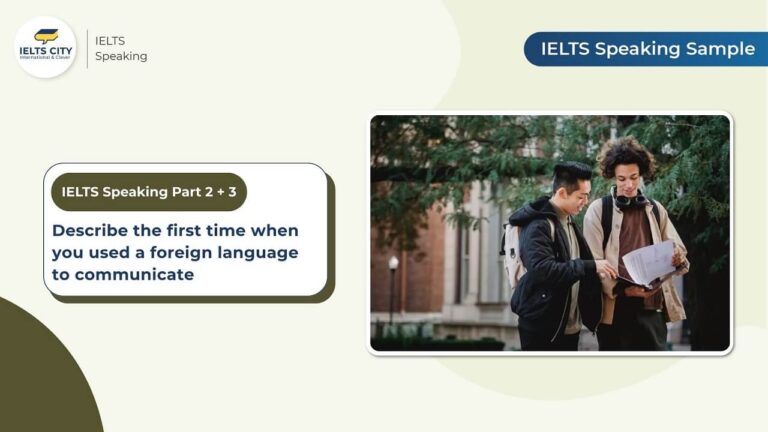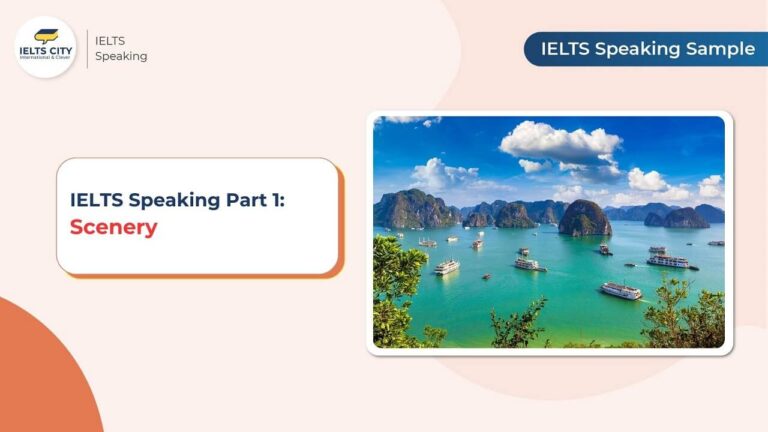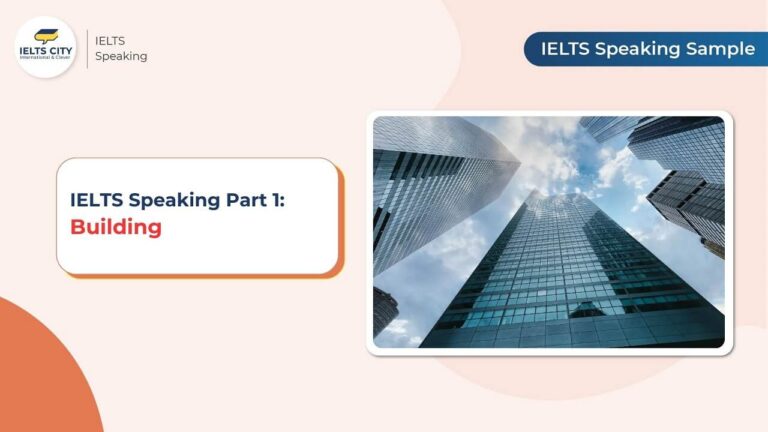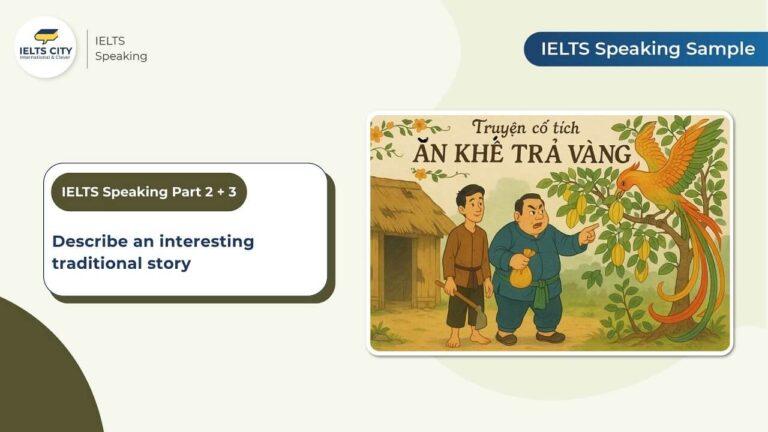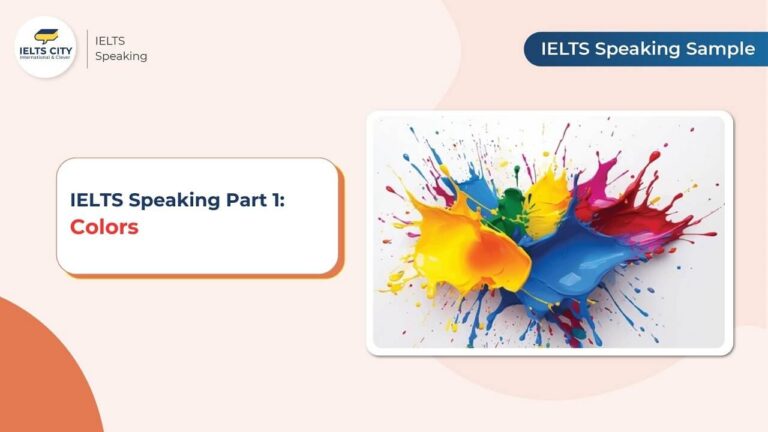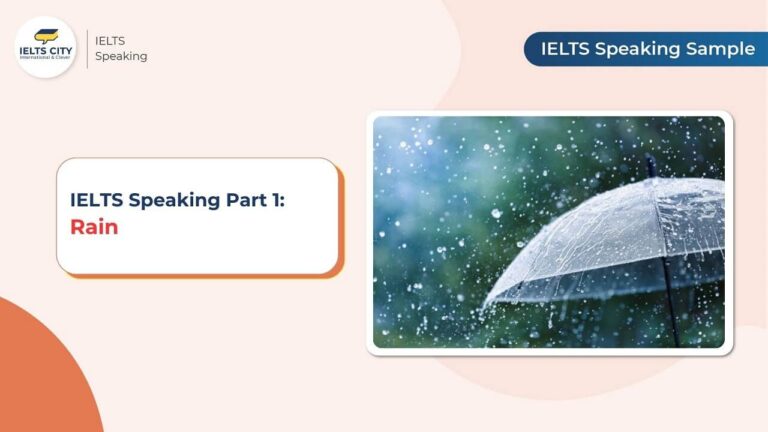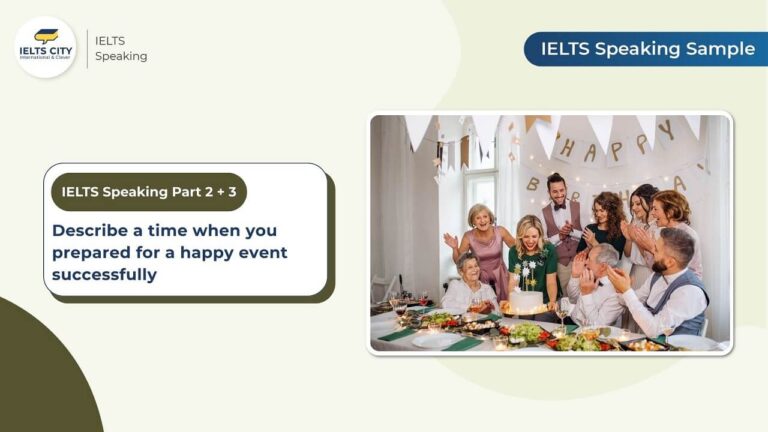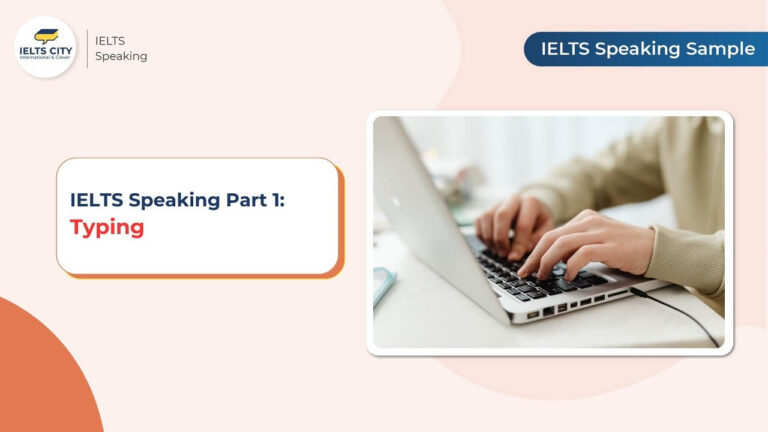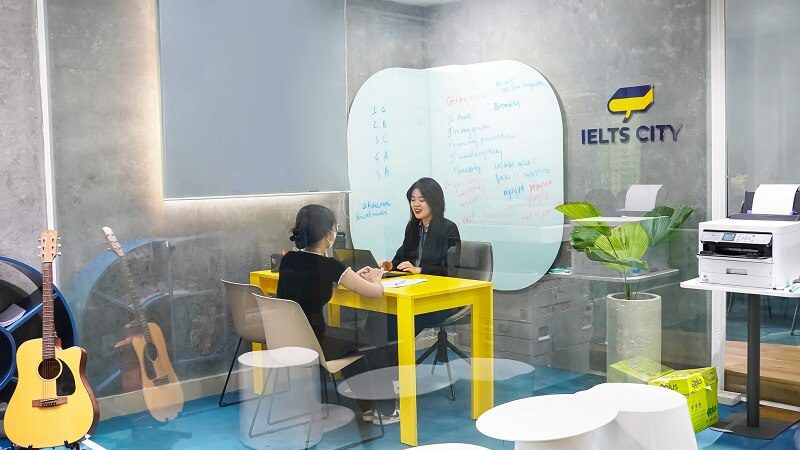Describe an important plant in your country là một đề bài trong nhóm chủ đề Describe an object khá phổ biến trong IELTS Speaking. Với đề bài này, các bạn sẽ mô tả một loài cây quan trọng đối với quốc gia của mình. Để trả lời tốt chủ đề này, các bạn hãy cùng IELTS CITY tham khảo các bài mẫu Speaking Part 2 và 3 kèm theo từ vựng hay phía sau nhé!
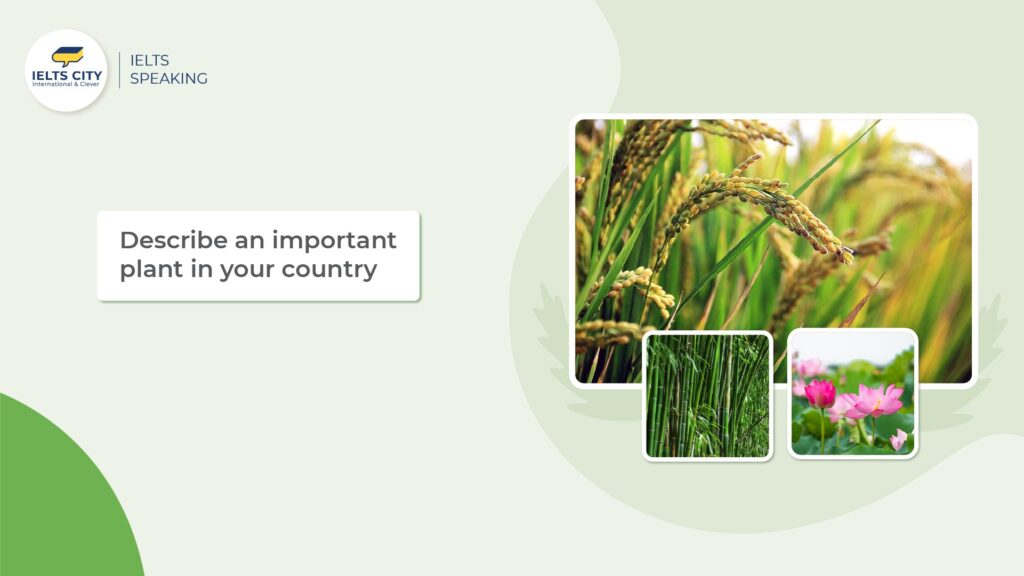
Nội dung chính
Toggle1. Bài mẫu Describe an important plant in your country – IELTS Speaking Part 2
Cue card:
| Describe an important plant in your country |
|---|
| You should say: – What the plant is – How you know it – Why it is important And explain how much you like the plant. |
Các biến thể khác của đề:
- Describe a plant flower or tree that is famous or important in your country
- Describe an important plant that grows in your country
- Describe an important plant (flower) in your country
Hướng dẫn chi tiết: Cách trả lời IELTS Speaking Part 2
1.1. Bài mẫu Describe an important plant in your country – Rice plant
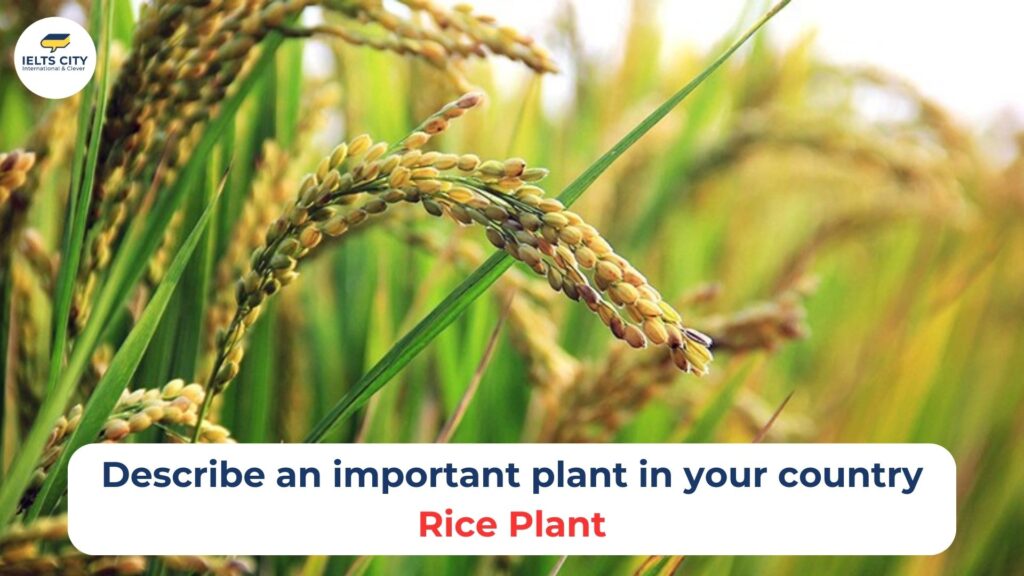
Dàn ý
Introduction
- Plant: rice
- Describe rice as a staple food.
How you know it
- Mention knowing about rice since childhood.
- Recount experiences with grandparents who were farmers and school field trips to rice paddies.
Why it is important
- Explain its role as the main food source in daily meals.
- Discuss its economic importance as a major export and source of livelihood.
- Highlight cultural significance and association with prosperity and festivals.
Explain how much you like the plant
- Express appreciation for rice.
- Enjoyment of various rice dishes.
- Emphasize its cultural and dietary importance.
Bài mẫu
Nhấn “►” để nghe Podcast bài mẫu:
I would like to talk about a very important plant in my country, Vietnam, which is rice. Rice is a staple food in Vietnam and is deeply ingrained in our culture and daily life.
I have known about rice since I was a child. Growing up in Vietnam, you can’t miss the sight of vast green rice fields stretching across the countryside. My grandparents were farmers, and they often shared stories about how they grew rice and the hard work that went into it. Additionally, during school field trips, we visited rice paddies and learned about the traditional methods of rice cultivation.
Rice is essential to Vietnam for several reasons. Firstly, it is the main food source for the majority of the population. Almost every meal includes rice or a rice-based dish. Secondly, rice farming is a major part of the Vietnamese economy. Millions of people work in rice cultivation, and Vietnam is one of the world’s largest exporters of rice. This contributes significantly to the country’s GDP and provides livelihoods for many rural families.
Moreover, rice has cultural and symbolic importance. It is often associated with prosperity and good fortune. During festivals and special occasions, various rice-based dishes are prepared and enjoyed by families. For example, during Tet, the Vietnamese Lunar New Year, traditional sticky rice cakes called “bánh chưng” are made and shared among relatives and friends.
I personally have a great appreciation for rice, not only because it is a fundamental part of my diet, but also because of its cultural significance. I enjoy eating different types of rice dishes, from simple steamed rice to more elaborate recipes like “cơm tấm” and “phở”. The versatility of rice makes it a beloved ingredient in our cuisine.
Từ vựng
- Staple food (n): thực phẩm chính
- Ingrained (adj): ăn sâu, thâm căn cố đế
- Cultivation (n): việc canh tác
- Prosperity (n): sự thịnh vượng
- Versatility (n): tính đa năng, sự linh hoạt
Dịch
Tôi muốn nói về một loại cây rất quan trọng ở đất nước tôi, Việt Nam, đó là cây lúa. Cây lúa là thực phẩm chính ở Việt Nam và có ảnh hưởng sâu rộng trong văn hóa và đời sống hàng ngày của chúng tôi.
Tôi đã biết về cây lúa từ khi còn nhỏ. Lớn lên ở Việt Nam, bạn không thể không nhìn thấy những cánh đồng lúa xanh mướt trải dài khắp nông thôn. Ông bà của tôi là những người nông dân và họ thường kể cho tôi nghe về việc trồng lúa và công việc vất vả liên quan. Ngoài ra, trong các chuyến tham quan trường học, chúng tôi đã đến thăm các cánh đồng lúa và học về các phương pháp canh tác lúa truyền thống.
Cây lúa rất quan trọng đối với Việt Nam vì nhiều lý do. Trước tiên, nó là nguồn thực phẩm chính trong bữa ăn của hầu hết người dân. Gần như bữa ăn nào cũng có cơm hoặc các món ăn từ gạo. Thứ hai, việc trồng lúa là một phần quan trọng trong nền kinh tế Việt Nam. Hàng triệu người làm việc trong ngành trồng lúa, và Việt Nam là một trong những quốc gia xuất khẩu gạo lớn nhất thế giới. Điều này đóng góp đáng kể vào GDP của đất nước và cung cấp sinh kế cho nhiều gia đình nông thôn.
Hơn nữa, lúa còn có ý nghĩa văn hóa và biểu tượng. Nó thường được liên kết với sự thịnh vượng và may mắn. Trong các lễ hội và dịp đặc biệt, nhiều món ăn từ gạo được chế biến và thưởng thức cùng gia đình. Ví dụ, trong dịp Tết Nguyên Đán, những chiếc bánh chưng truyền thống được làm từ gạo nếp và chia sẻ giữa người thân và bạn bè.
Tôi cá nhân rất trân trọng cây lúa, không chỉ vì nó là phần thiết yếu trong chế độ ăn uống của tôi, mà còn vì ý nghĩa văn hóa của nó. Tôi thích ăn các món ăn từ gạo khác nhau, từ cơm trắng đơn giản đến những món phức tạp như “cơm tấm” và “phở”. Sự đa dạng của gạo làm cho nó trở thành một nguyên liệu yêu thích trong ẩm thực của chúng tôi.
Đăng ký nhận tư vấn miễn phí
Ưu đãi học phí lên đến 50%
& Cơ hội nhận học bổng trị giá 4.000.000 VNĐ
Đăng ký nhận tư vấn miễn phí
Ưu đãi học phí lên đến 50%
________
1.2. Bài mẫu Describe an important plant in your country – Bamboo
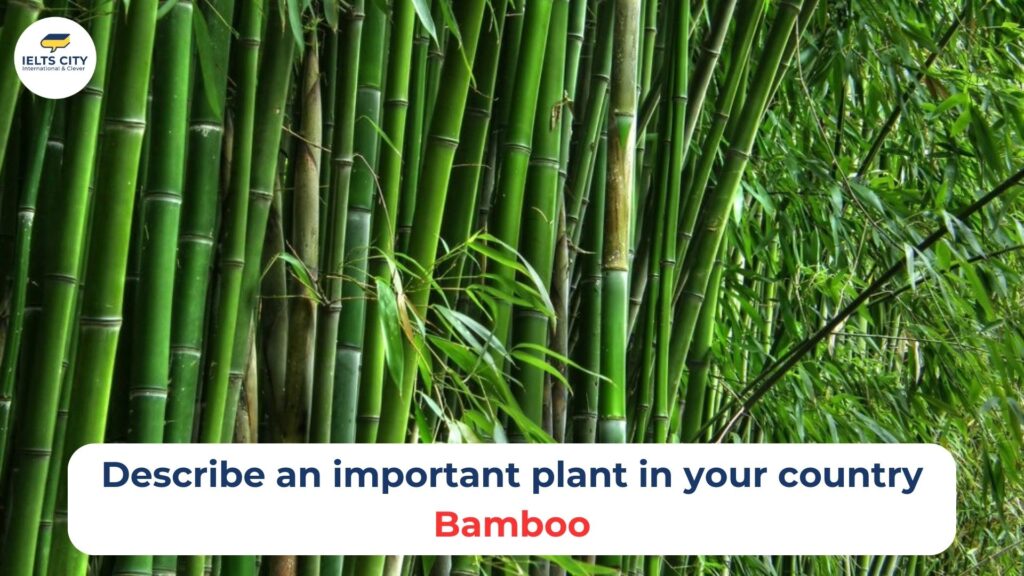
Dàn ý
Introduction
- Plant: Bamboo
- Importance: A versatile and significant plant in Vietnam
How you know it
- Early Encounter: Traditional items made from bamboo in childhood
- Family Connection: Bamboo garden at home and use in daily life
- Education: Learning about bamboo in school
What it is like
- Versatility: Used in a wide range of products including baskets, furniture, and construction materials
- Cultural Role: Important in traditional architecture, crafts, and festivals
- Environmental Benefits: Rapid growth, prevents soil erosion, absorbs CO2
Experiences
- Family Use: Seeing bamboo used in various items and structures at home
- Cultural Significance: Bamboo in traditional festivals and ceremonies
- Personal Appreciation: Enjoying bamboo furniture and decorations
Reasons why you like it
- Practicality and Beauty: Aesthetic appeal and functional use
- Environmental Impact: Sustainable growth and positive environmental contributions
- Cultural Value: Importance in culture and heritage
Bài mẫu
Nhấn “►” để nghe Podcast bài mẫu:
I would like to describe an important plant in Vietnam: bamboo. Bamboo is a versatile and significant plant that plays a crucial role in Vietnamese culture and daily life.
I first encountered bamboo in my childhood through the many traditional items made from it, such as baskets and furniture. My family has always had a bamboo garden, and I grew up seeing bamboo used in various ways around the house and garden. I also learned about bamboo in school, where we studied its uses and importance in Vietnamese culture.
Bamboo is important in Vietnam for several reasons. Firstly, it is incredibly versatile and used in a wide range of products. Bamboo is used to make traditional items like baskets, mats, and furniture, as well as construction materials like scaffolding and poles. Secondly, bamboo plays a significant role in traditional Vietnamese architecture and crafts. Many traditional houses and structures are built with bamboo, and it is also used in various festivals and ceremonies.
Moreover, bamboo is an environmentally friendly plant. It grows quickly and helps prevent soil erosion, making it a sustainable resource. It also absorbs carbon dioxide and produces oxygen, contributing positively to the environment.
I personally appreciate bamboo for its practicality and beauty. I enjoy the aesthetic appeal of bamboo furniture and decorations in my home. Additionally, bamboo’s rapid growth and environmental benefits make it a valuable resource that I admire and support.
In conclusion, bamboo is more than just a plant in Vietnam; it is an integral part of our culture, economy, and environment. I truly value its multifaceted role and the way it enhances both our daily lives and our heritage.
Từ vựng
- Versatile (adj): đa dụng, linh hoạt
- Significant (adj): quan trọng
- Scaffolding (n): giàn giáo
- Sustainable (adj): bền vững
- Aesthetic (adj): thẩm mỹ
Dịch
Tôi muốn mô tả một loại cây quan trọng ở Việt Nam: cây tre. Cây tre là một loại cây đa dụng và quan trọng, đóng vai trò quan trọng trong văn hóa và đời sống hàng ngày của người Việt.
Tôi lần đầu tiên biết về cây tre từ khi còn nhỏ qua những vật dụng truyền thống được làm từ tre, chẳng hạn như giỏ và đồ nội thất. Gia đình tôi luôn có một vườn tre, và tôi lớn lên thấy tre được sử dụng theo nhiều cách khác nhau quanh nhà và vườn. Tôi cũng học về cây tre ở trường, nơi chúng tôi tìm hiểu về các ứng dụng và tầm quan trọng của nó trong văn hóa Việt Nam.
Cây tre quan trọng ở Việt Nam vì nhiều lý do. Thứ nhất, tre rất đa dụng và được sử dụng trong nhiều sản phẩm. Tre được dùng để làm các vật dụng truyền thống như giỏ, chiếu, và đồ nội thất, cũng như vật liệu xây dựng như giàn giáo và cọc. Thứ hai, tre đóng vai trò quan trọng trong kiến trúc và nghề thủ công truyền thống của Việt Nam. Nhiều ngôi nhà và công trình truyền thống được xây dựng bằng tre, và nó cũng được sử dụng trong các lễ hội và nghi lễ.
Hơn nữa, cây tre là một loại cây thân thiện với môi trường. Nó phát triển nhanh và giúp ngăn ngừa xói mòn đất, làm cho nó trở thành một nguồn tài nguyên bền vững. Nó cũng hấp thụ carbon dioxide và sản xuất oxy, đóng góp tích cực cho môi trường.
Tôi cá nhân rất trân trọng cây tre vì tính thực tiễn và vẻ đẹp của nó. Tôi thích vẻ thẩm mỹ của đồ nội thất và trang trí từ tre trong ngôi nhà của mình. Hơn nữa, sự phát triển nhanh chóng và lợi ích môi trường của tre làm cho nó trở thành một nguồn tài nguyên quý giá mà tôi đánh giá cao và ủng hộ.
1.3. Bài mẫu Describe an important plant in your country – Lotus
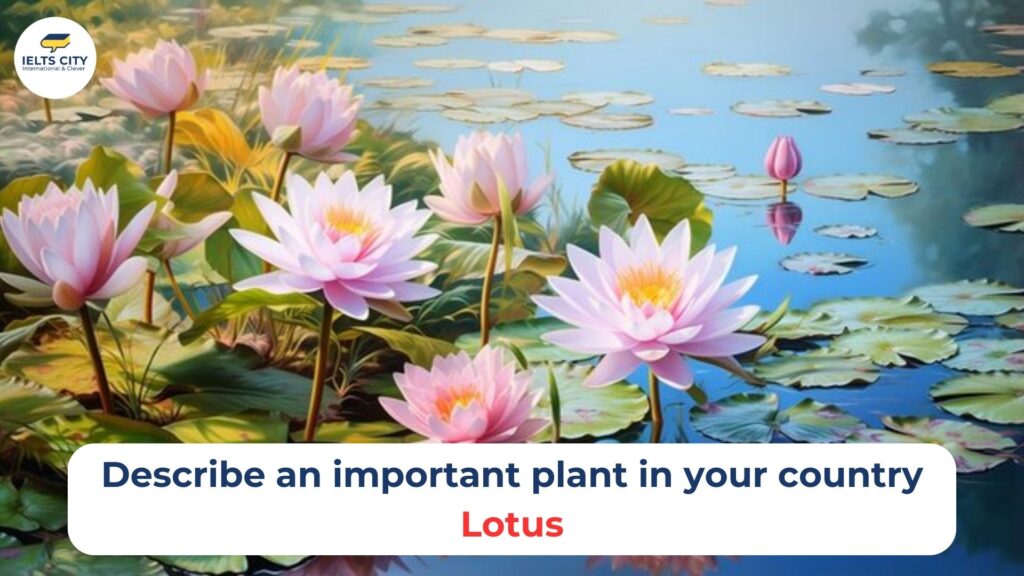
Dàn ý
Introduction
- Plant: Lotus flower
- Importance: Holds cultural and spiritual value in Vietnam
How you know it
- Early Encounter: Observing lotus flowers in temples and pagodas
- Education: Learning about the lotus in school
What it is like
- Cultural and Spiritual Role: Associated with purity, enlightenment, and rebirth
- Use in Medicine: Parts of the lotus used in traditional herbal remedies
- Symbolism: Represents resilience and beauty
Experiences
- Cultural Significance: Lotus in religious ceremonies and festivals
- Personal Appreciation: Enjoying the beauty of lotus flowers and their symbolism
Reasons why you like it
- Elegance and Symbolism: Inspiring beauty and spiritual depth
- Cultural and Personal Value: Enhances cultural and personal life
Bài mẫu
Nhấn “►” để nghe Podcast bài mẫu:
I would like to describe an important plant in Vietnam: the lotus flower. The lotus is a significant plant that holds great cultural and spiritual value in Vietnamese society.
I first encountered the lotus flower when I was a child during visits to temples and pagodas, where lotus flowers were often featured in religious ceremonies and decorations. I also learned about the lotus in school, where we studied its symbolism and importance in Vietnamese culture.
The lotus is important in Vietnam for several reasons. Firstly, it is deeply rooted in Vietnamese culture and spirituality. The lotus is often associated with purity, enlightenment, and rebirth. It is a common motif in Buddhist art and is frequently used in religious ceremonies and festivals. Secondly, the lotus is also important in traditional medicine. Various parts of the lotus, such as its seeds and petals, are used for their medicinal properties in herbal remedies.
Moreover, the lotus is a symbol of resilience and beauty. It grows in muddy waters but produces stunning flowers that represent overcoming adversity and achieving inner peace. This symbolism resonates with many people in Vietnam, making the lotus a powerful and revered plant.
I personally have a deep appreciation for the lotus. I find its elegance and the symbolism behind it truly inspiring. I enjoy seeing lotus flowers in ponds and gardens and appreciate their role in cultural and spiritual practices. The lotus holds a special place in my heart because it represents both natural beauty and spiritual depth.
Từ vựng
- Significant (adj): quan trọng
- Symbolism (n): ý nghĩa biểu tượng
- Spirituality (n): tinh thần, tâm linh
- Resilience (n): khả năng phục hồi, sức chịu đựng
- Motif (n): họa tiết, chủ đề
Dịch
Tôi muốn mô tả một loại cây quan trọng ở Việt Nam: hoa sen. Hoa sen là một loại cây có giá trị văn hóa và tinh thần lớn trong xã hội Việt Nam.
Tôi lần đầu tiên gặp hoa sen khi còn nhỏ, trong các chuyến thăm chùa và đền, nơi hoa sen thường xuất hiện trong các nghi lễ tôn giáo và trang trí. Tôi cũng học về hoa sen ở trường, nơi chúng tôi tìm hiểu về ý nghĩa biểu tượng và tầm quan trọng của nó trong văn hóa Việt Nam.
Hoa sen quan trọng ở Việt Nam vì nhiều lý do. Thứ nhất, hoa sen có sự gắn bó sâu sắc với văn hóa và tâm linh Việt Nam. Hoa sen thường được liên kết với sự tinh khiết, giác ngộ và sự tái sinh. Đây là một họa tiết phổ biến trong nghệ thuật Phật giáo và thường được sử dụng trong các nghi lễ và lễ hội tôn giáo. Thứ hai, hoa sen cũng quan trọng trong y học truyền thống. Các phần của hoa sen, như hạt và cánh hoa, được sử dụng vì các đặc tính chữa bệnh trong các phương pháp điều trị thảo dược.
Hơn nữa, hoa sen là biểu tượng của sức mạnh và vẻ đẹp. Nó mọc trong nước bùn nhưng lại sản sinh ra những bông hoa tuyệt đẹp, đại diện cho việc vượt qua khó khăn và đạt được bình yên nội tâm. Ý nghĩa biểu tượng này rất phù hợp với nhiều người ở Việt Nam, làm cho hoa sen trở thành một loại cây mạnh mẽ và được kính trọng.
Tôi cá nhân rất yêu thích hoa sen. Tôi thấy sự duyên dáng của nó và ý nghĩa đằng sau nó thực sự là nguồn cảm hứng. Tôi thích nhìn thấy hoa sen trong các ao và vườn và đánh giá cao vai trò của nó trong các thực hành văn hóa và tinh thần. Hoa sen có một vị trí đặc biệt trong trái tim tôi vì nó đại diện cho vẻ đẹp tự nhiên và chiều sâu tinh thần.
2. Bài mẫu IELTS Speaking Part 3 chủ đề Important plant in your country
Hướng dẫn chi tiết: Cách trả lời IELTS Speaking Part 3
2.1. What plants are important to the economy in your country?
In Vietnam, rice, coffee, and rubber are really important for the economy. Firstly, rice is a staple food and a major export, especially from the Mekong Delta. It supports millions of farmers and brings in a lot of money. Secondly, coffee, particularly Robusta beans, is another big one. Vietnam is actually the second-largest coffee exporter in the world, which provides a lot of jobs in the Central Highlands and generates significant revenue. Finally, rubber is key too. There are many rubber plantations in the southeastern and central regions, supplying materials for various industries. These plants are crucial for Vietnam’s economic stability and growth.
Từ vựng
- Staple food (n): thực phẩm chính
- Export (n): xuất khẩu
- Revenue (n): doanh thu
- Stability (n): sự ổn định
Dịch
Ở Việt Nam, lúa, cà phê và cao su thực sự quan trọng đối với nền kinh tế. Thứ nhất, lúa là thực phẩm chính và là mặt hàng xuất khẩu chủ lực, đặc biệt là từ vùng Đồng bằng sông Cửu Long. Nó hỗ trợ hàng triệu nông dân và mang lại nhiều tiền. Thứ hai, cà phê, đặc biệt là hạt Robusta, là một mặt hàng quan trọng khác. Việt Nam thực sự là nước xuất khẩu cà phê lớn thứ hai trên thế giới, cung cấp rất nhiều việc làm ở vùng Tây Nguyên và tạo ra doanh thu đáng kể. Cuối cùng, cao su cũng rất quan trọng. Có nhiều đồn điền cao su ở các khu vực phía Đông Nam và miền Trung, cung cấp nguyên liệu cho nhiều ngành công nghiệp khác nhau. Những loại cây này rất quan trọng đối với sự ổn định và phát triển kinh tế của Việt Nam.
2.2. What are the features of living in the countryside?
Living in the countryside offers a range of distinctive features that many people find appealing. Firstly, there is a sense of tranquility and peace that is often absent in urban areas. The countryside typically has less noise and air pollution, providing a healthier environment. Additionally, the scenery is usually more picturesque, with vast fields, forests, and natural landscapes. People in rural areas often have a closer connection to nature and can enjoy outdoor activities such as hiking, fishing, and gardening. Community ties also tend to be stronger, with neighbors often knowing and helping each other more than in cities.
Từ vựng
- Tranquility (n): sự yên tĩnh
- Picturesque (adj): đẹp như tranh
- Pollution (n): ô nhiễm
- Community ties (n): mối quan hệ cộng đồng
Dịch
Cuộc sống ở nông thôn mang đến nhiều đặc điểm đặc biệt mà nhiều người thấy hấp dẫn. Đầu tiên, có một cảm giác yên bình và tĩnh lặng thường thiếu vắng ở các khu vực đô thị. Nông thôn thường có ít tiếng ồn và ô nhiễm không khí, cung cấp một môi trường lành mạnh hơn. Ngoài ra, phong cảnh thường đẹp hơn, với các cánh đồng rộng lớn, rừng và cảnh quan thiên nhiên. Người dân ở khu vực nông thôn thường có sự kết nối gần gũi hơn với thiên nhiên và có thể tận hưởng các hoạt động ngoài trời như đi bộ đường dài, câu cá và làm vườn. Các mối quan hệ cộng đồng cũng thường mạnh mẽ hơn, với hàng xóm thường biết và giúp đỡ lẫn nhau nhiều hơn so với ở thành phố.
2.3. Should schools teach children how to grow plants?
Yes, I believe schools should teach children how to grow plants. This knowledge is valuable for several reasons. Firstly, it helps children understand the importance of nature and how ecosystems function. Learning to grow plants can foster a sense of responsibility and patience as they care for living things. Additionally, gardening can teach children about sustainability and the benefits of producing their own food, promoting healthier eating habits. It can also be a practical way to introduce concepts of biology and environmental science in a hands-on manner.
Từ vựng
- Ecosystems (n): hệ sinh thái
- Sustainability (n): sự bền vững
- Responsibility (n): trách nhiệm
- Hands-on (adj): thực hành, trực tiếp
Dịch
Vâng, tôi tin rằng trường học nên dạy trẻ em cách trồng cây. Kiến thức này có giá trị vì nhiều lý do. Đầu tiên, nó giúp trẻ em hiểu được tầm quan trọng của thiên nhiên và cách các hệ sinh thái hoạt động. Học cách trồng cây có thể nuôi dưỡng tinh thần trách nhiệm và kiên nhẫn khi chúng chăm sóc các sinh vật sống. Ngoài ra, làm vườn có thể dạy trẻ em về sự bền vững và lợi ích của việc tự sản xuất thực phẩm, khuyến khích thói quen ăn uống lành mạnh hơn. Đây cũng có thể là một cách thực tế để giới thiệu các khái niệm về sinh học và khoa học môi trường một cách trực tiếp.
2.4. Why do some people prefer to live in the countryside?
Some people prefer to live in the countryside for various reasons. The primary reason is often the desire for a slower-paced and less stressful lifestyle. The countryside offers a peaceful environment, away from the hustle and bustle of city life. People also appreciate the cleaner air, open spaces, and the opportunity to live closer to nature. The cost of living can be lower in rural areas, making it more affordable for families. Additionally, some people value the sense of community and stronger social ties that are often found in smaller towns and villages.
Từ vựng
- Hustle and bustle (n): sự nhộn nhịp, ồn ào
- Affordable (adj): có khả năng chi trả
- Social ties (n): mối quan hệ xã hội
- Rural areas (n): khu vực nông thôn
Dịch
Một số người thích sống ở nông thôn vì nhiều lý do. Lý do chính thường là mong muốn có một lối sống chậm rãi và ít căng thẳng hơn. Nông thôn mang đến một môi trường yên bình, tránh xa sự nhộn nhịp của cuộc sống thành phố. Mọi người cũng đánh giá cao không khí trong lành, không gian mở và cơ hội sống gần gũi với thiên nhiên. Chi phí sinh hoạt có thể thấp hơn ở các khu vực nông thôn, làm cho nó trở nên dễ sống hơn cho các gia đình. Ngoài ra, một số người coi trọng mối quan hệ cộng đồng và sự gắn kết xã hội mạnh mẽ hơn thường thấy ở các thị trấn và làng mạc nhỏ.
2.5. Have new kinds of plants been grown in your city recently?
Yes, in recent years, new kinds of plants have been introduced in my city. Urban gardening and green initiatives have become increasingly popular, leading to the cultivation of various types of plants in community gardens and public spaces. For example, vertical gardens and rooftop farms have been established to grow vegetables, herbs, and flowers. These projects aim to improve urban biodiversity, provide fresh produce, and enhance the aesthetic appeal of the city. Additionally, efforts have been made to plant more native species and trees to create greener and more sustainable urban environments.
Từ vựng
- Urban gardening (n): làm vườn đô thị
- Biodiversity (n): đa dạng sinh học
- Vertical garden (n): vườn đứng
- Native species (n): loài bản địa
Dịch
Có, trong những năm gần đây, các loại cây mới đã được giới thiệu trong thành phố của tôi. Làm vườn đô thị và các sáng kiến xanh ngày càng trở nên phổ biến, dẫn đến việc trồng nhiều loại cây khác nhau trong các vườn cộng đồng và không gian công cộng. Ví dụ, các vườn đứng và các trang trại trên mái nhà đã được thành lập để trồng rau, thảo mộc và hoa. Những dự án này nhằm cải thiện đa dạng sinh học đô thị, cung cấp sản phẩm tươi và tăng cường vẻ đẹp thẩm mỹ của thành phố. Ngoài ra, đã có những nỗ lực trồng thêm các loài bản địa và cây xanh để tạo ra môi trường đô thị xanh và bền vững hơn.
2.6. Why do some people like to keep plants at home?
Many people like to keep plants at home for several reasons. Firstly, indoor plants can improve air quality by filtering pollutants and releasing oxygen. They also add aesthetic value to living spaces, making homes feel more welcoming and comfortable. Plants can have a calming effect, reducing stress and enhancing mental well-being. Additionally, tending to plants can be a rewarding hobby that provides a sense of accomplishment and connection to nature. For some, it is also a way to grow their own herbs or small vegetables, contributing to a more sustainable lifestyle.
Từ vựng
- Pollutants (n): chất gây ô nhiễm
- Aesthetic (adj): thẩm mỹ
- Well-being (n): sức khỏe, hạnh phúc
- Sustainable lifestyle (n): lối sống bền vững
Dịch
Nhiều người thích giữ cây trong nhà vì nhiều lý do. Đầu tiên, cây trong nhà có thể cải thiện chất lượng không khí bằng cách lọc các chất ô nhiễm và thải ra oxy. Chúng cũng thêm giá trị thẩm mỹ cho không gian sống, làm cho ngôi nhà trở nên ấm cúng và thoải mái hơn. Cây có thể có tác dụng làm dịu, giảm căng thẳng và nâng cao sức khỏe tinh thần. Ngoài ra, chăm sóc cây có thể là một sở thích thú vị, mang lại cảm giác hoàn thành và kết nối với thiên nhiên. Đối với một số người, đó cũng là cách để trồng các loại thảo mộc hoặc rau nhỏ của riêng họ, góp phần vào lối sống bền vững hơn.
2.7. Are there many trees in your city?
Yes, there are many trees in my city, although it depends on the area. The city has numerous parks and green spaces where trees are abundant, providing shade, beauty, and recreational areas for residents. Street trees are also commonly planted along roads and sidewalks to enhance the urban environment and improve air quality. The local government has implemented various tree-planting initiatives to increase the number of trees and promote a greener cityscape. However, in more densely populated and industrial areas, the presence of trees can be less noticeable, and ongoing efforts are needed to ensure that all parts of the city benefit from urban greenery.
Từ vựng
- Recreational areas (n): khu vực giải trí
- Street trees (n): cây đường phố
- Urban environment (n): môi trường đô thị
- Tree-planting initiatives (n): các sáng kiến trồng cây
Dịch
Có, có nhiều cây trong thành phố của tôi, mặc dù điều này còn tùy thuộc vào khu vực. Thành phố có nhiều công viên và không gian xanh nơi có nhiều cây, cung cấp bóng mát, vẻ đẹp và khu vực giải trí cho người dân. Cây đường phố cũng thường được trồng dọc theo các con đường và vỉa hè để tăng cường môi trường đô thị và cải thiện chất lượng không khí. Chính quyền địa phương đã thực hiện nhiều sáng kiến trồng cây để tăng số lượng cây và thúc đẩy cảnh quan thành phố xanh hơn. Tuy nhiên, ở các khu vực đông đúc và công nghiệp hơn, sự hiện diện của cây có thể ít đáng chú ý hơn, và các nỗ lực liên tục là cần thiết để đảm bảo rằng tất cả các phần của thành phố đều được hưởng lợi từ mảng xanh đô thị.
Cập nhật đề thi IELTS Speaking mới nhất:
Vậy là IELTS CITY đã chia sẻ tất tần tật các bài mẫu IELTS Speaking Part 2,3 về chủ đề Describe an important plant in your country kèm theo nhiều từ vựng hay. Hy vọng sau những bài mẫu này, các bạn nắm được cách triển khai ý trả lời và tự tin chinh phục điểm cao trong lần thi Speaking sắp tới nhé. Chúc các bạn thành công!


